A nutrient that doesn’t always get the spotlight in prenatal nutrition is vitamin B12. Vitamin B12 is popular in the mainstream as a nutrient that gives energy; this is why you’ll find high amounts of it in many energy drinks.
And, that’s not wrong — vitamin B12 does help power our cells. But in pregnancy, it does even more than that for both mom and baby.
In this article I’ll share about why vitamin B12 is necessary during pregnancy, what the lasting effects of vitamin B12 deficiency are, and how to optimize your vitamin B12 intake during pregnancy.
This article is especially important for those who don’t consume much or any animal foods (such as vegans and vegetarians).
Vitamin B12 & Pregnancy: A Nutrient Crucial for Your Baby’s Health
Vitamin B12 — also known as cobalamin — is used in the creation of new DNA, proteins, and lipids. It works in conjunction with folate to help develop new cells and to support the function of existing cells (via a process called methylation). As you can imagine, this makes vitamin B12 a very important nutrient in pregnancy when your body is pretty much constantly creating new cells.
Vitamin B12 is also a vital nutrient for brain development, both during pregnancy and in early infancy. It supports the growth of neurons and also the myelin sheath that surrounds and insulates nerves (including within the brain and spinal cord). This is why low levels of vitamin B12 have been linked to detrimental effects on neurological development.
Why vitamin B12 is important in pregnancy
From the earliest stages of development through the latter part of pregnancy, vitamin B12 is involved in many stages of fetal development.
In early pregnancy, when the nervous system is just starting to develop, a structure called the neural tube is forming. This connects the upper part of the spine to the brain. When this process is disrupted, a structural problem called a neural tube defect can occur. A variety of nutrients are involved in the closure of the neural tube. While folate usually gets the spotlight, vitamin B12 is also very much involved in this process. In fact, vitamin B12 deficiency is a known contributor to neural tube defects. Since the neural tube closes by about 4 weeks after conception, it’s critical that your body has sufficient vitamin B12 stores before pregnancy. Likewise, this is the case for many other nutrients that support the closure of the neural tube, namely folate, choline, vitamin B6, zinc, and several more.
Deficiency in vitamin B12 is also associated with disproportionate fetal growth (low muscle mass and excess fat mass), increased insulin resistance, intrauterine growth restriction, and lifelong susceptibility to certain chronic diseases.
Low serum vitamin B12 has been associated with higher rates of preeclampsia. A systematic review and meta analysis of over 3,200 pregnancies found that women with preeclampsia have significantly lower B12 levels compared to women without this complication. Furthermore, B12 may play a role in the severe variation of preeclampsia known as HELLP syndrome (Hemolysis, Elevated Liver enzymes and Low Platelets). There have even been a number of published case reports detailing how certain suspected cases of HELLP syndrome actually end up being extreme vitamin B12 deficiency rather than typical preeclampsia.
Another possible pregnancy complication related to B12 is anemia. Although most people assume anemia is only an iron issue, there are a number of nutrients that play a role. Vitamin B12 deficiency can lead to a type of anemia where your red blood cells become too large and dysfunctional (macrocytic anemia).
If a mother is vitamin B12 deficient during pregnancy, it can result in vitamin B12 deficiency in her baby. Maternal vitamin B12 levels at approximately 18 weeks gestation is a reliable predictor of vitamin B12 status in lactation and in the infant through the first 6 months of life. In the third trimester, mom’s vitamin B12 levels tend to decrease. This is thought to be due to hormonal changes, hemodilution (more fluids in your circulatory system), and an increased transfer of vitamin B12 from mother to baby. When a mother has low vitamin B12 levels during pregnancy, she will remain depleted postpartum unless she begins supplementing. A mother who is deficient has lower vitamin B12 concentrations in her breast milk. These two things combined – less vitamin B12 transferred to the baby during gestation and via breast milk – put the baby at risk for a vitamin B12 deficiency.
Often, because the body preferentially transfers maternal vitamin B12 to the baby in utero, the baby has some vitamin B12 stores at birth. But, if a consistent supply of B12 is not available (which is the case in exclusively breastfed infants of B12-deficient mothers), B12 stores become depleted in the baby by 4 to 7 months of age. This can show up as symptoms such as delayed growth and development (failure to thrive), regression in neuromotor skills (such as losing the ability to roll over or grasp objects), failure to maintain eye contact (even in an infant who previous could do so), general muscle weakness, lethargy, excessive sleepiness, feeding difficulties, and even brain shrinkage. Yes, brain shrinkage (termed cerebral atrophy in the research).
While early treatment to correct for vitamin B12 deficiency is absolutely imperative to the baby’s recovery, it is unfortunately often a situation of “too little, too late.” Tragically, vitamin B12 deficiency in babies results in irreversible brain injury in approximately 50% of cases, even after B12 deficiency is corrected with supplementation.
In one case study, a 5 month old breastfed infant of a vegan mother (who actually received a prenatal vitamin containing 96% of her daily needs of B12 throughout her pregnancy) presented with many of the above symptoms and required a 19 day hospital stay to stabilize.
Despite correcting his severe B12 and iron deficiency with supplementation, this child remained delayed 7 months after treatment and upon MRI, still showed signs of inadequate myelination, suggesting that he may never achieve full neurological function. This case is a crucial reminder of the importance of sufficient B12 levels both during pregnancy and throughout lactation.
We have to remember that during the first 1,000 days — from conception to about 2 years of life — there are many stages of development that only take place during a specific window of time. If you miss it, there can be dire consequences. This is why maternal health researchers have put so much work into educating on the importance of preconception, prenatal, and postpartum nutrition. Your baby is counting on you!
Signs and symptoms of vitamin B12 deficiency in pregnancy
Women who are well-nourished typically have sufficient vitamin B12 stores to meet fetal needs during gestation, assuming their diet continues to provide this nutrient. But what defines someone as “well nourished?” How do you know if you could be deficient in B12? How common is vitamin B12 deficiency during pregnancy?
Prevalence of vitamin B12 deficiency in pregnancy
Certainly not everyone is deficient in vitamin B12, and deficiency rates vary widely in different parts of the world depending on food availability and dietary practices. Here are some stats from various countries:
- In America, 23.3% of pregnant women have insufficient B12 levels, while 6.6% are overtly deficient. Comparatively, the general adult population has a deficiency rate of <5%, suggesting that low B12 status is more common in pregnancy.
- In Canada, about 5% of women are deficient in vitamin B12 in early pregnancy.
- In south-eastern Turkey, 72% of mothers and 41% of babies have vitamin B12 deficiency, as defined by blood levels <160 pg/mL. In this same study, 48% of mothers and 23% of babies had severe deficiency of <120 pg/mL. (Note that these deficiency cut offs are a lot lower than what other researchers use, which suggests that deficiency rates are even worse than this study suggests.)
- In Pakistan, 42% have vitamin B12 deficiency in the first trimester.
- In India, the prevalence of vitamin B12 deficiency during pregnancy is between 40-70%. In Nepal, it’s 71.5%. Exclusively breastfed infants in India also have a high rate of vitamin B12 deficiency (over 63%) due to insufficient B12 levels in the breast milk of deficient mothers. Notably, this population has some of the lowest intake of animal food due to either a vegetarian diet (for preference or for religious reasons) or limited access or affordability of animal foods. Also, supplementation with folic acid is routine in India, but that is not the case with vitamin B12. Excessive intake of folic acid can mask or worsen a deficiency in vitamin B12. This is why some researchers are calling on the Indian government to provide vitamin B12 supplementation routinely for all pregnant women.
- In Germany, 41.1% of mothers have B12 levels below the normal range. Vitamin B12 deficiency is increasingly being found in newborns, particularly from mothers who eat a vegetarian diet. In fact, vitamin B12 deficiency is actually more common than inborn errors of metabolism (the genetic disorders that are typically tested for via a newborn heel prick). For this reason, some researchers are calling for vitamin B12 screening to become part of routine testing for infants.
Vitamin B12 deficiency in vegan and vegetarian diets
Vitamin B12 is only found in foods of animal origin. There are no naturally-occurring bioactive forms of vitamin B12 from plant sources, despite many claims to the contrary.*
Because vegan and vegetarian diets lack animal foods, this leaves a significant nutrient gap in these dietary patterns, unless the person is consuming a significant amount of B12-fortified foods or is supplementing.
In women who are vegetarian and pregnant, 62% are deficient in vitamin B12. These are not small numbers!
I certainly believe that everyone has the right to follow whichever dietary pattern best suits their culture, beliefs, and preferences, but I think it’s really important that pregnant and lactating women (in particular) who follow a no/low-meat diet understand where they may be nutritionally vulnerable and supplement accordingly (more on that topic in this article).
*Note on B12 analogues in plant foods: There’s a widespread myth in the vegan community that vitamin B12 can be reliably obtained from fermented foods and algae. While they can, in some cases, contain very small amounts of B12, it is primarily in the form of biologically inactive look-alikes (known as vitamin B12 analogues) that worsen, rather than improve, vitamin B12 status. In one study, vegans who attempted to meet B12 needs from so-called alternative sources (algae, kombucha, and other fermented products), had the most severe degree of vitamin B12 deficiency when compared to other vegans who consumed vitamin B12-fortified foods or took B12 supplements. In fact, all of the vegans in this study who did not take a B12 supplement were severely deficient. If you are vegan, a vitamin B12 supplement is an absolute necessity. Even among vegetarians who regularly consume eggs and dairy products, a supplemental source of vitamin B12 is recommended because sufficient blood levels of the nutrient are often not achieved from vegetarian sources alone. You’ll understand why this is the case when you look at the concentrations of B12 in eggs and dairy in the food sources section later in this article.
Other causes of B12 deficiency (besides low intake)
While vitamin B12 deficiency is most commonly blamed on low intake, it can also occur for other reasons, such as pernicious anemia or other issues with vitamin B12 absorption.
One factor that can impair absorption is the use of acid-blocking medications. This is one of many reasons I prefer another approach to acid reflux and heartburn in pregnancy. Some medications can also predispose you to B12 deficiency, such as long-term use of metformin. Talk to your provider and consider checking your B12 levels if you take any of these.
Symptoms of vitamin B12 deficiency
People with vitamin B12 deficiency often have physical symptoms of tingling and numbness in their extremities, gait abnormalities, or changes to their vision. From a neurological and cognitive standpoint, they may also suffer from memory loss and dementia.
The tricky thing about vitamin B12 deficiency though, is that it can be asymptomatic. Because the body has multiple “back up” mechanisms to keep you going, you can tolerate a diet low in vitamin B12 or even a disorder that impairs vitamin B12 absorption for years before developing clinical symptoms of deficiency.
Another consideration with vitamin B12 deficiency, is that you may also not feel symptoms because of your intake of folic acid. Intake of synthetic folic acid (from fortified foods or supplements) of >1,000 mcg/day may “mask” vitamin B12 deficiency symptoms. I cover more on this phenomenon in my folate article. This is why I’m in favor of a comprehensive prenatal vitamin in lieu of supplementing individual nutrients, and part of the reason I’m especially cautious with folic acid supplementation (methylfolate is a much wiser choice; it does not mask B12 deficiency).
How is a vitamin B12 deficiency diagnosed? What are optimal serum B12 levels?
A typical range for serum vitamin B12 is between 190 and 950 pg/mL. Some studies use an “insufficiency” threshold, in addition to a deficiency threshold. I personally do not like to see vitamin B12 in pregnancy drop below 300 pg/mL.
Some research from Germany has shown that an even higher threshold (over 500 pg/mL) is necessary in early-to-mid pregnancy to maintain vitamin B12 levels throughout pregnancy, lactation, and to support an infant’s vitamin B12 status (via breast milk) through 6 months of age. If you happen to delve into the research on B12 deficiency, be sure you’re looking closely at how the study defined deficiency, insufficiency, and normal levels.
Besides low serum vitamin B12, elevated methylmalonic acid (MMA) is often seen with B12 deficiency. Two other surrogate markers of B12 deficiency are elevated homocysteine and MCV, although several other nutrient deficiencies can cause these levels to be elevated, so be sure to work with your provider when interpreting any lab test results.
Can you have too much vitamin B12?
There has been controversy raised by some research showing an association between high maternal vitamin B12 levels and the risk of autism. The threshold at which this association has been observed is serum levels over 813 pg/mL (600 pmol/L). Make note of the unit conversion. Many people misinterpret studies by not cross checking the units!
The challenge with making sense of these associations is that I’ve not seen a single study in a pregnant population that is not also supplemented with high doses of folic acid. High blood levels of folic acid are also associated with a higher risk of autism. Given the many unknowns with high dose folic acid supplementation, particularly unmetabolized folic acid (as covered in my folate article), I’m not able to draw any strong conclusions here. And just to add another curve ball, low serum levels of vitamin B12 are also associated with a higher risk of autism. It’s possible that there’s a “sweet spot” for vitamin B12 levels. It’s also possible that these associations have nothing to do with vitamin B12 and rather that it is an innocent bystander. We need more research in this area.
If you have any concerns whether your intake of vitamin B12 is at a good level, ask your healthcare provider to check your B12 status.
How much vitamin B12 do you need if you’re pregnant?
Our conventional pregnancy guidelines recommend 2.6 mcg of vitamin B12 per day. For context, you can get that amount from about 4 ounces of ground beef. But, as is typical with many of the micronutrient guidelines in pregnancy, newer research has found that a much higher amount of vitamin B12 is ideal.
One clinical trial of pregnant and lactating mothers found that mothers needed to consume 3 times the recommended amounts of vitamin B12 to maintain adequate vitamin B12 status throughout pregnancy and lactation. That said, even with triple the vitamin B12 intake, pregnant mothers’ serum vitamin B12 dipped into the low-to-mid range of normal in this study.
This suggests that the current recommendation for vitamin B12 is likely not high enough. In fact, many countries have a higher recommended intake for B12 than we have in the U.S. If triple the amount — around 7.8 mcg/day or more — can lead to vitamin B12 on the lower end of the acceptable range during pregnancy, what happens to vitamin B12 levels when women only get the current recommended amount of 2.6 mcg/day? Or, what if they are vegan and relying entirely on a prenatal vitamin with “100% of the daily value”?
Best food sources of vitamin B12
Let’s talk about the best food sources of vitamin B12.
Meat, seafood, and foods that come from animals (dairy, eggs, etc.) are the only natural food sources of B12. The vitamin can also be fortified into foods (such as plant-based milks; check the labels!).
As with many micronutrients, the foods that have the highest concentration of vitamin B12 are organ meats and shellfish.
Clams, liver, octopus, and oysters are all highly concentrated sources of vitamin B12. So is liver, kidney, giblets, heart, and other organs. Having these items on occasion can really help boost your vitamin B12 status. Ground beef, milk, eggs, and chicken thighs are all also good sources of vitamin B12 and these foods are easier to consume in larger portions and on a more regular basis than organ meats and shellfish for most individuals. Here’s how they all compare:
Foods with the highest amounts of B12 per 100g serving:
- Clams (99 mcg), ~ ½ cup
- Lamb liver (77-90 mcg) ~ ½ liver
- Beef liver (71-83 mcg) 3.5 oz
- Lamb kidney (79 mcg) 3.5 oz
- Turkey liver (58 mcg) 3.5 oz
- Octopus (36 mcg) 3.5 oz
- Oysters (28-35 mcg) 3.5 oz
- Turkey giblets (33 mcg) 3.5 oz
- Beef kidney (25 mcg) 3.5 oz
- Turkey heart (22 mcg) 3.5 oz
- Veal brain (21 mcg) 3.5 oz
- Chicken liver (21 mcg) ~4 livers
Other food sources of vitamin B12:
- Ground beef 2.2 mcg per 3.5 oz
- Milk 1.1 mcg per 8 oz
- Eggs 1.2 mcg per 2 large eggs
- Chicken thigh 0.3 mcg per 3.5 oz
Vitamin B12 supplements and pregnancy
If these animal foods aren’t tolerable to you during pregnancy — first trimester nausea, anyone? — or if you follow a vegan or vegetarian diet, it’s still possible to increase your vitamin B12 status during pregnancy.
The quickest way to correct a vitamin B12 deficiency is to get injections of high doses of vitamin B12 (B12 shots). This is usually reserved for more severe cases of deficiency and per the discretion of your healthcare provider.
However, most people rely on oral supplements. One Cochrane review found that high-dose oral vitamin B12 supplements (1,000 mcg to 2,000 mcg per day) was as effective for correcting megaloblastic anemia as B12 shots.
You’ll notice that those doses are quite a bit higher than the RDA for B12. Since this nutrient is kind of tricky to absorb, and because any excess is readily excreted in your urine, it’s both preferable and perfectly safe to take in higher supplemental doses.
If you’re going to use an oral vitamin B12 supplement, it’s important that you consider the form of vitamin B12. Look for methylated B12 (methylcobalamin), hydroxocobalamin, adenosylcobalamin or a supplement with a combination of these forms.*
*A note on cyanocobalamin: Cyanocobalamin is the most commonly used form of B12 in supplements, however it is of questionable safety. The cyano- prefix refers to cyanide, which is highly toxic. A number of researchers have called for the replacement of cyanocobalamin in supplements with other, safer forms of vitamin B12 listed above. My preferred prenatal vitamins (found here and here) use the safer and more bioavailable forms of vitamin B12.
Summary
As you can see, there’s a lot to consider when optimizing vitamin B12 intake in pregnancy. In general:
- If you follow a vegan, vegetarian, or low-meat diet and are not supplementing with vitamin B12 you might be at risk for deficiency.
- The RDA For B12 is set at least 3x too low to support optimal vitamin B12 levels in pregnancy and lactation.
- If you intend to supplement vitamin B12, choose a form with methylcobalamin, hydroxocobalamin, adenosylcobalamin, or a combination of these (avoid cyanocobalamin, if possible).
- Vitamin B12 deficiency in pregnancy can predispose women to pregnancy complications (such as preeclampsia or neural tube defects). Mothers with a deficiency often birth babies with deficiencies, too. Early identification and treatment of infant B12 deficiency is imperative for their neurological development.
- Remember: you may not notice any symptoms of a vitamin B12 deficiency, especially if you’re getting adequate folate. You’ll need a lab test to rule out deficiency.
- Organ meats, shellfish, and other animal foods are the best sources of bioavailable vitamin B12. Having these consistently in your diet can help boost or sustain your vitamin B12 levels during pregnancy.
If you’re at risk for a vitamin B12 deficiency, you may want to ask your provider to check your vitamin B12 levels if you are pregnant or thinking of becoming pregnant. A good insurance policy is to take a comprehensive prenatal vitamin that contains vitamin B12 in a bioavailable form and in a sufficient amount.
Until next time,
Lily
PS – I’d love to hear your thoughts on vitamin B12 and pregnancy in the comments area below. Did your provider check your levels during pregnancy? Were you aware that vitamin B12 has so many important functions for you and your baby?
References
- Rashid, S, Meier, V, Patrick, H. Review of Vitamin B12 deficiency in pregnancy: a diagnosis not to miss as veganism and vegetarianism become more prevalent. Eur J Haematol. 2021; 106: 450– 455.
- Mardali, Farzaneh, et al. “Association between abnormal maternal serum levels of vitamin B12 and preeclampsia: a systematic review and meta-analysis.” Nutrition Reviews 79.5 (2021): 518-528.
- Govindappagari, Shravya, et al. “Severe vitamin B12 deficiency in pregnancy mimicking HELLP syndrome.” Case Reports in Obstetrics and Gynecology 2019 (2019).
- Chauvet, E., et al. “Symptoms of HELLP syndrome due to vitamin B12 deficiency: report of seven cases.” Journal de gynecologie, obstetrique et biologie de la reproduction 38.3 (2009): 226-230.
- Socha, Daniel S et al. “Severe megaloblastic anemia: Vitamin deficiency and other causes.” Cleveland Clinic journal of medicine vol. 87,3 (2020): 153-164.
- Bae, Sajin, et al. “Vitamin B-12 status differs among pregnant, lactating, and control women with equivalent nutrient intakes.” The Journal of Nutrition 145.7 (2015): 1507-1514.
- Guez, Sophie, et al. “Severe vitamin B12 deficiency in an exclusively breastfed 5-month-old Italian infant born to a mother receiving multivitamin supplementation during pregnancy.” BMC pediatrics 12.1 (2012): 1-5.
- Fothergill, Amy, and Julia Finkelstein. “Vitamin B12 status in women of reproductive age, NHANES 2013–2014.” The FASEB Journal 31 (2017): lb439-lb439.
- Behere, Rishikesh V et al. “Maternal Vitamin B12 Status During Pregnancy and Its Association With Outcomes of Pregnancy and Health of the Offspring: A Systematic Review and Implications for Policy in India.” Frontiers in Endocrinology vol. 12 619176. 12 Apr. 2021.
- Kadiyala, A., et al. “Prevalence of vitamin B12 deficiency among exclusively breast fed term infants in South India.” Journal of Tropical Pediatrics 67(1) (2021): fmaa114.
- Gramer, Gwendolyn et al. “Newborn Screening for Vitamin B12 Deficiency in Germany-Strategies, Results, and Public Health Implications.” The Journal of pediatrics vol. 216 (2020): 165-172.e4.
- Pawlak, R., et al. “How prevalent is vitamin B12 deficiency among vegetarians?” Nutrition Reviews 71(2) (2013): 110–117.
- Watanabe, F. “Vitamwardsin B12 sources and bioavailability.” Experimental Biology and Medicine 232(10) (2007): 1266–1274.
- Zugravu, C.-A., et al. “Efficacy of supplementation with methylcobalamin and cyancobalamin in maintaining the level of serum holotranscobalamin in a group of plant‑based diet (vegan) adults.” Experimental and Therapeutic Medicine 22(3) (2021): 1–7.
- Pawlak, R., et al. “The prevalence of cobalamin deficiency among vegetarians assessed by serum vitamin B12: a review of literature.” European Journal of Clinical Nutrition 68(5) (2014): 541–548.
- Niafar, Mitra, et al. “The role of metformin on vitamin B12 deficiency: a meta-analysis review.” Internal and emergency medicine 10 (2015): 93-102.
- Raghavan, Ramkripa, et al. “Maternal plasma folate, vitamin B12 levels and multivitamin supplementation during pregnancy and risk of Autism Spectrum Disorder in the Boston Birth Cohort.” The FASEB Journal 30 (2016): 151-6.
- Mills, J. L., and A. M. Molloy. “Lowering the risk of autism spectrum disorder with folic acid: can there be too much of a good thing?.” The American Journal of Clinical Nutrition 115.5 (2022): 1268-1269.
- Sourander, Andre, et al. “Maternal Serum Vitamin B12 during Pregnancy and Offspring Autism Spectrum Disorder.” Nutrients 15.8 (2023): 2009.

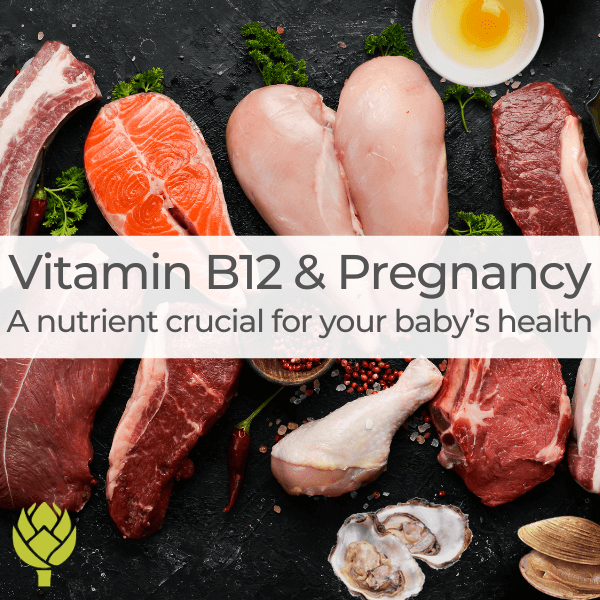

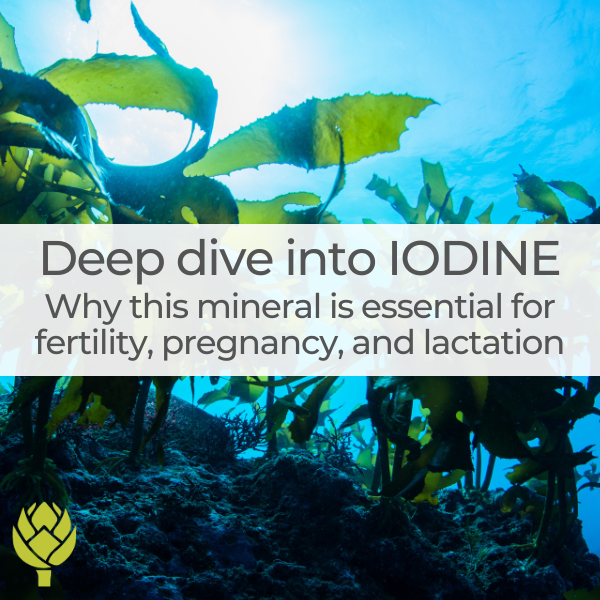
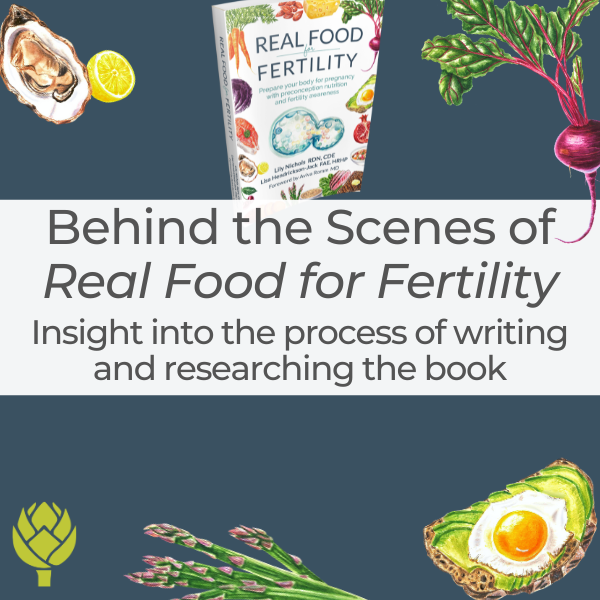
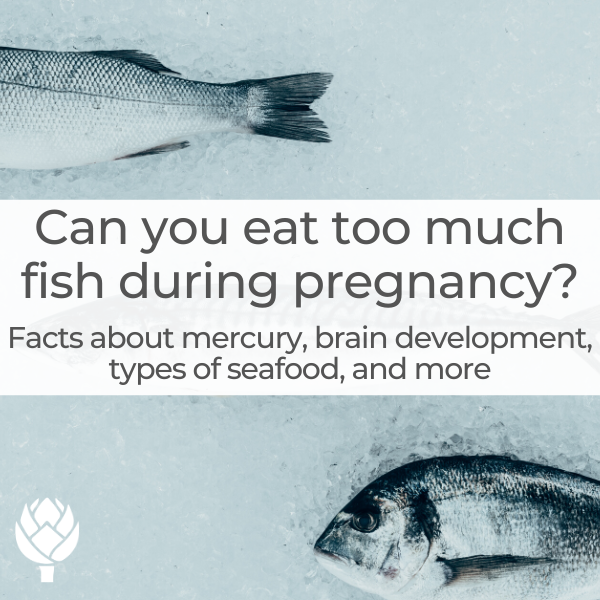
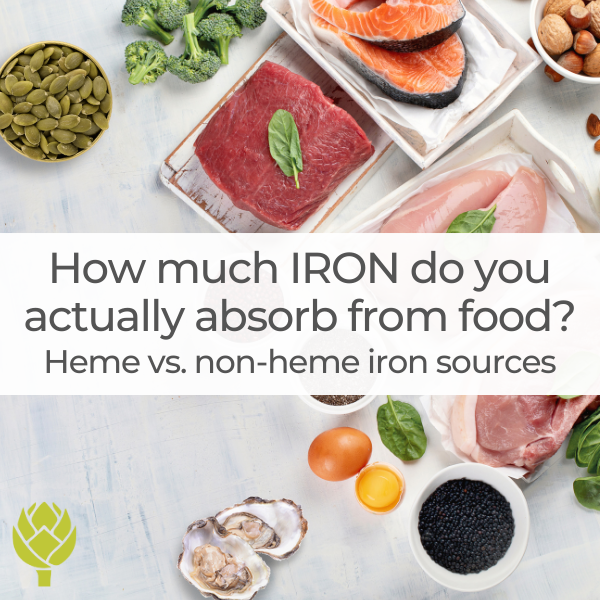



Great article! Thank you so much for all the work you do! You were my guide during pregnancy and now for postpartum.
Question, where can we find more info to guide us, on the statement you made regarding the first 1000 days?
I’d love to get more info to use as a guide and make sure these windows of development aren’t missed. I just don’t know where to look for this.
Thank you!
Jo
The last chapter of Real Food for Pregnancy has lots of information on postpartum and breastfeeding nutrition.
I also teach two professional-level webinars, one on postpartum recovery & nutrient repletion (which focuses on mom’s nutrition) and one on the nutrient transfer into breastmilk (which focuses on baby’s nutrition).
This really confuses me. I am hoping to conceive in about 6 months and I try to eat meat, liver, shellfish etc every week and take beef liver and bone marrow in pill form so I know I’m doing that right but am I at risk for getting too much if I then take a pre Natal vitamin while pregnant?
Unlikely to overdo it, since B12 is water soluble. The body readily excretes what it doesn’t need, but if you have any concerns, you can check your B12 levels with your clinician.
Great article as usual, Lily.
Some additional points that I addressed on the topic about high B12 and high folate levels associated with autism:
“The study that references a link between B12 and Autism rates in 2016 is poorly conducted according to Dr. Lynch, including not listing the types of folate and B12 taken.
The B12 study didn’t look at the reasons why the mothers had high folate or high b12 – it just made an association between who supplemented more – and they also didn’t define what they supplemented with – or what forms of nutrients. According to Dr. Lynch, high levels of folic acid are really problematic – that’s no doubt.†
High folate and high B12 levels in blood are signs that it is not getting into the tissues.
This is because of Methyl Trapping. High levels of folic acid can decrease the levels of methylfolate and this can cause an indirect elevation of vitamin B12.
“In addition, a significant interaction was observed between plasma folate and B12 (p<0.001) suggesting possible perturbation in one-carbon metabolism, which intimately involves both micronutrients.”
Optimal Prenatal helps reduce incidence of methyl trapping by using active folates and active forms of B12.
Inactive forms of folate and B12 are problematic. We use active forms. If the gene MTR is slowed by yeast overgrowth, nitrous oxide, various medications, inflammation, low glutathione, heavy metals, then this can increase blood levels of folate and B12.†
There is no mention of which types of B12 and folates were used in their study – and there was no control over it – It was just a survey of who supplemented with a prenatal and how often.†
Dr. Lynch began his epigenetic research with the MTHFR gene, and its role in producing an active form of folate (5- MTHF) for DNA methylation. He found that without adequate levels of B12, methylation cannot occur. In addition to this, MTR mutations need vitamin B12 to convert homocysteine to methionine.†
More specifically, the National Institute of Health states that "The MTR gene provides instructions for making an enzyme called methionine synthase. This enzyme plays a role in processing amino acids, the building blocks of proteins. Specifically, methionine synthase carries out a chemical reaction that converts the amino acid homocysteine to another amino acid called methionine. The body uses methionine to make proteins and other important compounds. To function properly, methionine synthase requires methylcobalamin (a form of vitamin B12) and another enzyme called methionine synthase reductase, which is produced from the MTRR gene."†
https://ghr.nlm.nih.gov/gene/MTR
I’ve been taking B12 supplements for years, since my mid-20s when I was diagnosed with a deficiency (vegetarian diet, maybe also hormonal birth control playing a role…). I’ve never understood how or why, but I developed a real dependency on them (I was taking 1000 mcg/day; anything less gave me weird neurological symptoms) and I was worried about getting pregnant because I’d heard about the studies showing the correlation between high B12 an autism risk. But I had an extremely easy and healthy pregnancy—following a lot of the advice in your book, including avoiding foods enriched with folic acid and taking a high-quality prenatal with methylfolate—and now have a super healthy, happy, smart little boy. I hope there’s more research done on this topic and how it relates to folic acid metabolism!
Great information! Have there been any studies comparing B12 levels in grass-fed animals vs. conventionally raised animals? I imagine the healthier the animal, the higher the nutrient levels are?
I haven’t seen any studies looking specifically at B12 levels. There are studies that show higher levels of vitamins A and E, lower omega-6 content, and higher CLA levels in grass-fed beef.
Great article! Thank you so much. Although, I knew the importance of folate and vitamin B12, I don’t believe I was ever tested on my levels. I will ask for that test. I do want to mention that I am a meat eater and currently taking the Seeking Health prenatals you suggested (which I was so happy to see mine was one of the two you liked!). And also taking THORNE 5-MTHF 1mg methylfolate daily. Am I putting myself at risk for toxicity. Or too much supplementation… I am currently 6 months pregnant and have been taking both 3 months before conception.
I love your articles!
In cases of malabsorption or pernicious anemia, can b12 blood test results be trusted? Does a high b12 serum mean you are actually absorbing and using the b12 (or do you still have to rely on other markers?). Some doctors recommend to stop the injections once a high value is reached. There’s a group online where their protocol is to self inject once or twice a week until neurological symptoms stop improving or b12 deficiency symptoms disappear. If it’s water soluble and most of the injection passes out of the body within a couple days, would frequent injections be needed to reverse a deficiency? Thanks for any thoughts!
Thank you for the wonderfully researched article! I’m curious if there’s a certain amount of B12 recommended for those with a MTHFR mutation. I’ve noticed my angular cheilitis resolved during pregnancy with my prenatal but came back when breastfeeding. I’ve started 2 additional pills of Fullwell on top of the regular dose and that’s helped.
This is very helpful. I applaud the time that you spend on research and studying peer-reviewed papers You really have a passion to help your patients. I will share this info. with my clients.
In the Philippines, we have traditional dishes that have organ meats, we have “sisig” in hot plate and “kare kare”. .
Liver seems to be a good source of many B vitamins. However, I’ve heard to be careful with liver intake due to it being a detox organ. Any suggestions?
I address this concern, and many others about liver, in this article: LIVER AND ORGAN MEAT: NUTRITIONAL BENEFITS & HOW TO MAKE IT PALATABLE
Perfect! Follow up question. I started putting some nutritional yeast in my smoothies. And I know many people who use nutritional yeast. However just looked at the packaging that states it uses folic acid and cyanocobalamin. After reading this article, would cons outweigh benefits?